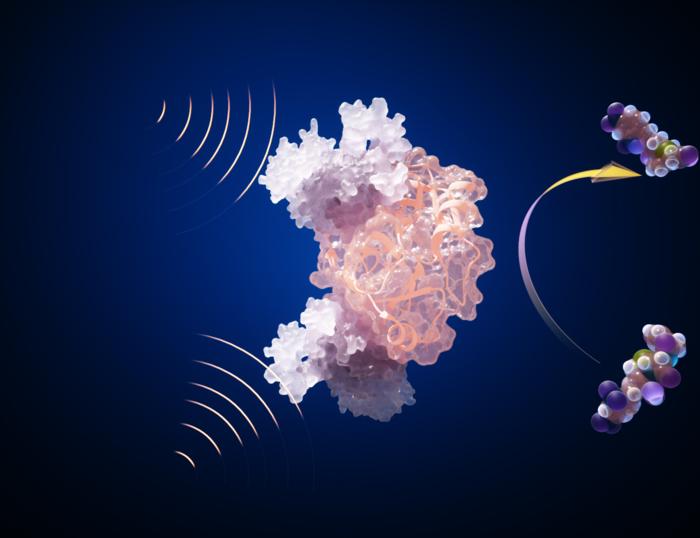
In a groundbreaking development that combines synthetic biology and innovative technology, researchers from Queensland University of Technology (QUT) have unveiled a prototype biosensor capable of detecting rare earth elements (REEs). This revolutionary device has the potential to transform how industries utilize and extract these critical materials, which are essential components in numerous electronic devices, batteries, and electric motors. As the demand for these unique substances surges, this biosensor emerges as a pragmatic solution to address the challenges associated with traditional extraction methods.
Currently, the extraction of lanthanides, a group of rare earth elements, is facing significant hurdles. The growing demand for these elements in various high-tech applications has not only led to supply shortages but has posed exorbitant financial and environmental costs associated with conventional mining practices. The revelation of this biosensor technology speaks to an urgent need within the industry to devise more sustainable, cost-effective methods for identifying and extracting these materials. QUT’s research team, led by Professor Kirill Alexandrov, has engineered proteins to create molecular nanomachines that can signal the presence of lanthanides with impressive precision.
At the heart of this biosensor technology lies a hybrid protein, or “chimera,” carefully crafted by fusing a lanthanide-binding protein known as LanM with an antibiotic-degrading enzyme known as beta-lactamase. This innovative combination enables the protein to act as a biological switch that activates solely in the presence of lanthanides. When lanthanides are detected, the hybrid protein responds by generating detectable signals, which can be visualized through noticeable color changes or even electrical outputs. Such capabilities mark a significant advancement over traditional methods, which can be time-consuming and often require extensive chemical analysis.
The interdisciplinary research team comprised not only QUT’s native scientists—Professor Alexandrov, Dr. Zhong Guo, Patricia Walden, and Dr. Zhenling Cui—but also collaborated with prominent researchers from CSIRO Advanced Engineering Biology Future Science Platform and Clarkson University in the USA. This international collaboration exemplifies the convergence of diverse expertise aimed at tackling critical issues surrounding the detection of rare earth elements. Their joint efforts culminated in the publication of their findings in the esteemed journal Angewandte Chemie International, showcasing the potential impact of this research on future technological advancements.
One of the most striking demonstrations of the biosensor’s efficacy lies in its application using modified bacteria. These engineered microbes exhibited remarkable resistance against antibiotics, surviving exposure largely due to the presence of lanthanides. This level of specificity emphasizes the precision with which the biosensor operates, revealing the critical interactions between the proteins and the rare metals. The implications of such an application extend beyond mere detection; they could pave the way for bioengineering organisms that directly interact with and recover valuable metals from their environment.
In an era where sustainable practices are paramount, the QUT research team envisions broader applications for their prototype biosensor. Beyond rare earth elements, there is persistent interest in adapting the technology to detect and recover a wide range of metals. As industries seek to transition to greener methods of resource extraction and supply chains evolve to meet the demands of modern technology, this biosensor’s adaptability could lead to its implementation across various sectors.
Moreover, in future studies, the research team plans to enhance the specificity of these molecular switches, allowing for more accurate differentiation between closely related rare earth elements. This degree of differentiation is crucial, as the presence of various lanthanides often occurs simultaneously in various environmental contexts. This fine-tuning could potentially revolutionize methods for both resource optimization and environmental monitoring.
The prospect of engineering microbes capable of extracting valuable metals directly from ocean water presents an exciting frontier for the research team. Such an innovation holds enormous implications for both marine resource management and the ever-increasing demand for rare earth elements. As Professor Alexandrov articulates, these ambitious goals are not just theoretical; they represent tangible steps toward employing biological tools for sustainable practices in metal recovery and resource management.
The mechanics of protein switches, as evidenced by this new research, unveil an advanced understanding of biochemistry that may redefine industrial applications. As scientists continue to explore the fundamental workings of these proteins, insights gleaned from this work may inspire future generations of biosensors, leading to even more sophisticated and efficient detection technologies.
The publication of this research heralds a new chapter in the intersection of biological sciences and technological innovation. It underscores the vital role of interdisciplinary collaboration in solving some of the pressing challenges of our time. As this narrative unfolds, industry partners are already expressing keen interest in the technology, which hints at a future where biosensors become integral tools in resource management and environmental conservation.
In conclusion, QUT’s development of a biosensor for rare earth elements stands as a testament to the potential of synthetic biology in shaping the future of technology. As researchers continue to advance this prototype and refine its applications, the implications for sustainable practices in resource extraction become not just feasible but truly transformative. The journey from laboratory to application illustrates the power of innovation to change the landscape of industries reliant on rare earth elements, thereby fortifying the link between scientific discovery and societal advancements.
Subject of Research: Detection of rare earth elements using engineered biosensors
Article Title: QUT scientists develop groundbreaking biosensor for rare earth element detection
News Publication Date: 24-Jan-2025
Web References: DOI
References: Angewandte Chemie International Edition
Image Credits: QUT
Keywords
Biosensors, Bacterial proteins, Chemical biology, Molecule nanomachines, Rare earth elements, Sustainable practices, Synthetic biology, Environmental conservation.
Tags: challenges in rare earth element supplycost-effective extraction solutionsenvironmental impact of mininghigh-tech material sourcinginnovative biosensor technologylanthanide-binding proteinsmolecular nanomachines in biosensingProfessor Kirill Alexandrov’s research teamQueensland University of Technology researchrare earth element detectionsustainable extraction methodssynthetic biology applications





